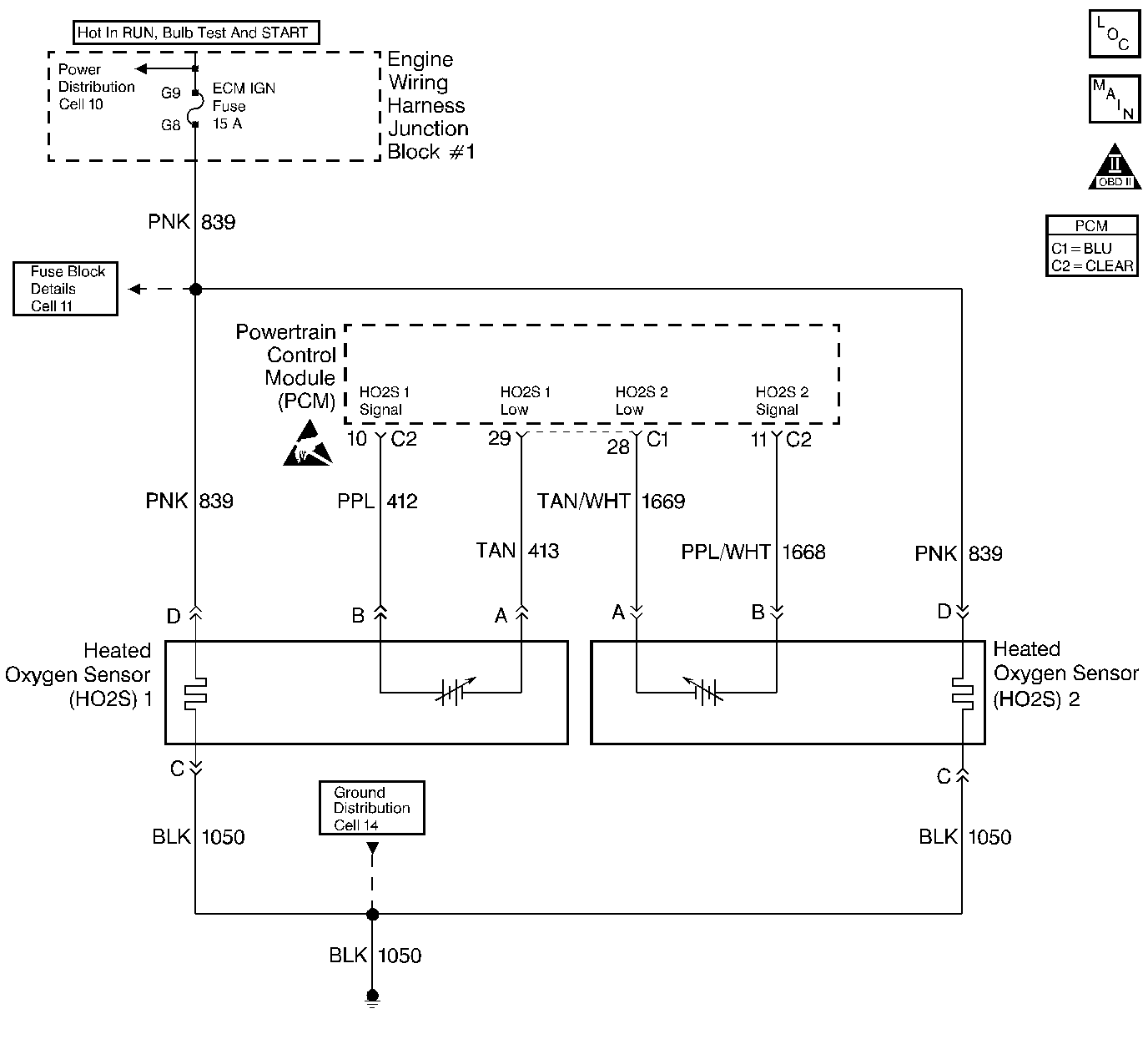
Circuit Description
The PCM continuously monitors the Heated Oxygen Sensor (HO2S) activity for 100 seconds. During the monitor period the PCM counts the number of times that the HO2S responds from rich to lean and from lean to rich and adds the amount of time it took to complete all transitions. With this information, an average time for all transitions can be determined. The PCM then divides the rich to lean average by the lean to rich average to obtain a ratio. If the HO2S transition time ratio is not within range, DTC P1134 will be set, indicating that the oxygen sensor is not responding as expected to changes in exhaust oxygen content
Conditions for Running the DTC
| • | No active MAF, TP, IAT, MAP, ECT, EGR sensor, injector circuit, EVAP, fuel trim, or HO2S heater DTCs. |
| • | Mass Air Flow is between 10 and 30 g/s. |
| • | ECT is greater than 50°C (122°F). |
| • | Engine speed is between 1000 and 3000 RPM. |
| • | Above conditions present for a 100 second monitoring period after closed loop. |
Conditions for Setting the DTC
| • | HO2S 1 transition time ratio is less than 0.5 or greater than 5. |
| • | The conditions is present for a 100 second monitoring period. |
Action Taken When the DTC Sets
| • | The PCM will illuminate the malfunction indicator lamp (MIL) during the second consecutive trip in which the diagnostic test has been run and failed. |
| • | The PCM will store conditions which were present when the DTC set as Freeze Frame and Failure Records data. |
Conditions for Clearing the MIL/DTC
| • | The PCM will turn OFF the MIL during the third consecutive trip in which the diagnostic has been run and passed. |
| • | The History DTC will clear after 40 consecutive warm-up cycles have occurred without a malfunction. |
| • | The DTC can be cleared by using the scan tool. |
Diagnostic Aids
A malfunction in the HO2S heater ignition feed or ground circuit may cause a DTC P1134 to set. Check HO2S heater circuitry for intermittent faults or poor connections. Refer to Intermittents and Poor Connections Diagnosis and Connector Repairs in Wiring Systems. If connections and wiring are OK and DTC P1134 continues to set, replace the HO2S 1.
Reviewing the Fail Records vehicle mileage since the diagnostic test last failed may help determine how often the condition that caused the DTC to be set occurs. This may assist in diagnosing the condition.
Test Description
The number below refers to the step number on the Diagnostic Table:
Step | Action | Value(s) | Yes | No | ||||||||
1 | Was the Powertrain On Board Diagnostic (OBD) System Check performed? | -- | ||||||||||
2 |
Important: : If any DTCs are set (except P0133), refer to those DTCs before proceeding with this diagnostic chart.
Does scan tool indicate DTC failed this ignition? | -- | Go to Diagnostic Aids | |||||||||
3 |
Was an exhaust leak isolated? | -- | ||||||||||
Visually/physically inspect the following items:
Was a problem found in any of the above areas? | -- | |||||||||||
5 |
Does the scan tool indicate voltage near the specified value? | 450 mV | ||||||||||
6 |
Does scan tool indicate voltage below specified value? | 300 mV | ||||||||||
7 | Repair condition as necessary. Did you complete the repair? | -- | -- | |||||||||
8 | Repair open HO2S 1 low signal circuit or grounded HO2S 1 high signal circuit. Refer to Wiring Repairs in Wiring Systems. Did you complete the repair? | -- | -- | |||||||||
9 | Repair the open HO2S 1 high signal circuit or the faulty PCM connections. Refer to Wiring Repairs in Wiring Systems. Did you complete the repair? | -- | -- | |||||||||
10 | Replace HO2S 1. Refer to Heated Oxygen Sensor Replacement . Did you complete the repair? | -- | -- | |||||||||
11 |
Does scan tool indicate DTC failed this ignition? | -- | Repair complete |
